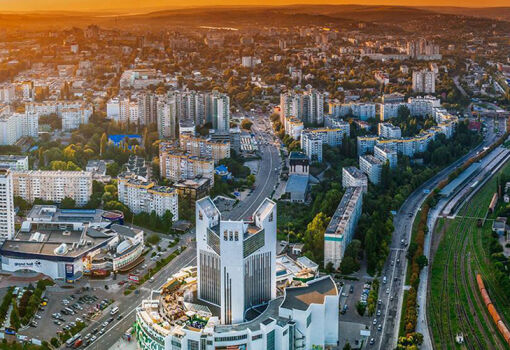
I would like to make it clear at once that I am not affiliated with any political force. I am not a member of the opposition, nor am I burdened with any public office. I express here exclusively my own opinion as a responsible citizen of the country and a patriot of Moldova. An opinion backed by experience and knowledge acquired during many years of public service and working in responsible positions in an international company.
Recently, Logos Press published in two issues the article “Institutional Reanimation” by Valeriu Chitzan, former Minister of Finance and well-known statesman (see LP Nos. 22 and 23 of June 13 and 20, 2025 – ed.).
First, I would like to express my gratitude to this reputable and solid publication for its commitment over the years to the principles of honest and professional journalism. With the publication of these articles, they have once again confirmed their concern for the fate of the country and their desire to become a platform for discussion of serious problems. I emphasize this because today, unfortunately, Moldovan journalism is more and more focused on serving the interests of the authorities or political elites, bypassing important and necessary topics for society. Or presenting them mainly in a political context.
Secondly, I fully support the assessments of the economic and political situation in the country, as well as the problems of public administration contained in these articles by Valeriu Chitsan. They are not only verified, but also, one could say, suffered by the author. Having a deep knowledge of the whole system of public administration from the inside, Valeriu Chitzan not only diagnoses the state of the national economy and the main problems of the society, but also proposes concrete steps to be taken for the institutional reanimation of the public administration in Moldova and to get on the path of development.
One can argue with these assessments. One can disagree with Valeriu Chitsan’s opinions. But they deserve to be studied and to try to synthesize the main idea – the country needs fundamental reforms. Not declarative, not ostentatious, but real reforms. Deep and thoughtful. Aimed at the interests of the country and people living in Moldova, not at reports to external partners.
How to make a “Moldovan miracle”
Recent statistics leave no doubt – the country is in a deep crisis. Every year and even every month the situation in the economy is getting worse, the living standards of citizens are getting lower. The revenue part of the budget depends more and more on external revenues, not on internal economic processes.
In order not to be unsubstantiated, here are some fresh figures. According to the National Bank, Moldova’s external debt in the first quarter of 2025 exceeded $10.5 billion and amounted to 57.4% of the country’s gross domestic product. The current account deficit of the balance of payments increased 2.3 times during the year and exceeded 1 billion at the end of the first quarter. Its ratio to GDP reached an unprecedented in the history of the country anti-record – 25.8%. To understand the abyss in which the Moldovan economy found itself, it is necessary to say that in the world practice the level of current account deficit above 5% is considered “alarming” for foreign investors.
In short, the conclusion from all this is simple – we are no longer meeting the internal needs of the country. We live in debt, at the expense of foreign borrowings. This would not be so terrible if it were simply a matter of shifting to our children and grandchildren the payment of what we spend today.
But the problem is much deeper than that. We are going into debt, but we are not creating the conditions for economic development. This means that our children will not be able to pay back our debts. They will not have the economic base for this, which we are destroying today.
In this situation, it is particularly depressing that before the parliamentary elections, political leaders and party representatives talk very little about the country’s economy. About what needs to be done for economic development, for the country’s transition to qualitative growth. No one needs populist statements without a comprehensive analysis of the situation and conceptual approaches to its solution.
In this context, I would like to emphasize a simple, but extremely important and necessary in the current conditions postulate: the economic situation in the country is so complicated, and to solve the accumulated problems we need such programmatic and extraordinary solutions that no government, no political force alone can cope with it. It was Jesus Christ who performed a miracle, feeding 5 thousand people with 5 loaves. We will not be able to do that.
In order to perform the “Moldovan miracle”, the political elites of Moldova need to discard parochial principles and ambitions, uniting around the main task for today – the elaboration of a viable economic paradigm of development.
This issue can be taken out of the political battles. Reach a consensus and create a special body, including experienced government professionals – economists, lawyers, managers – to brainstorm and work out a long-term strategy for the country’s economic development. This body should be absolutely devoid of political coloring and personal bias. And its developments should then be approved through the parliament in the form of long-term documents of the country’s development.
The key element is decentralization
I would like to hope that such a body will be created and we will get a truly viable and extremely necessary development paradigm for the country. But it is not for nothing that they say: “Rich is not the one who knows how to earn, but the one who knows how to spend”.
Just a simple statement: in Moldova, the number of officials per 1000 inhabitants is much higher than in European countries. There are no exact data on this issue, the categories of officials differ from country to country. But this fact is undeniable, including in European circles.
The Moldovan authorities also realize it. Every now and then attempts are made to optimize, “voluntary unification” of mayoralties and other steps aimed at reducing the administrative apparatus.
But all these are half-measures. They will never give the desired result, because they do not solve the main problem – giving local authorities real powers and full responsibility for the situation in the localities they govern.
Moldova needs not just an administrative-territorial reform to mathematically reduce the number of mayoralties and administrative staff in them. It needs a comprehensive multi-stage modernization of the entire state administration system.
At the heart of this system should be the mayoralties – self-sufficient and self-governing. All taxes collected locally should remain at their disposal. And local authorities should be given all the powers to manage the territories. They should finance education, health care, social services, municipal police, environmental protection… Attract investment and build economic capacity to be able to do so.
We often refer to the example of Switzerland. In this matter, Moldova could fully adopt its experience and move to real decentralization and self-government. In Switzerland, cantons hold 2-3 referendums every year, deciding by popular vote all the most important issues for the territories.
It is clear that for real self-financing each mayor’s office should have at least 7-8 thousand people. Residents should receive all necessary services, including documentation of the population, in their localities. By the way, Romania has already made significant progress in this area.
Districts in the current conditions have long outlived themselves, they have practically no real powers, finances and functions. They should be liquidated.
Consolidation of mayoralties and elimination of districts will allow to reduce the staff of officials and administrative costs by 3-4 times. In addition, it will significantly reduce the corruption component in the government structures (people on the ground will monitor how each leu is spent), and the bureaucratic burden on business will be reduced.
And the main thing is that local authorities will be directly interested in the development of the economy in their locality and investments. After all, the taxation base depends on it, and consequently, the well-being of citizens. Today, there is no such thing, because local authorities have their hands tied, and all key decisions are made in Chisinau.
Therefore, it is necessary not just an administrative-territorial reform, but a comprehensive modernization of the state management system. With the adoption of new Tax and Customs Codes, with changes in the principles of tax administration and revenue distribution, with the adoption of a whole range of related legislative norms for the functioning of all levels of government.
At the same time, it should be clearly understood that political parties and the central government will always be against such a radical reform. Even if they pay lip service to it. After all, it leads to the loss of control over the regions from the center. And most importantly, they will no longer be able to manage budgetary financial flows and use them for their own political purposes.
Therefore, such a reform is possible only on the basis of a broad consensus in society and “initiative from below”. The central government should retain only the functions of foreign policy, defense, and the formulation of common sectoral policies. It should be financed by customs revenues and fixed contributions from the regions (or a set percentage rate).
Instead of concluding
It is clear that many people will consider these proposals too radical or even utopian. But based on my experience of familiarizing myself with the state structure of many European countries, I can say unequivocally: nothing is impossible.
Moreover. Moldova has practically no other way but real economic transformation and deep decentralization of management. For some reason, many people in Moldova are sure that if we join the EU, all problems will be solved by themselves, we will live richly and happily. And the authorities present the process of European integration in this way.
Unfortunately, it is not so. It is necessary to enter the European Union not with a collapsed economy and a divided society, but with a strong and viable state, a stable economy and a stable tax base.
Viktor HROPOTINSKY,
prefect of Edinet district in 1999-2002, administrator of Agro-SZM Moldova for 20 years





